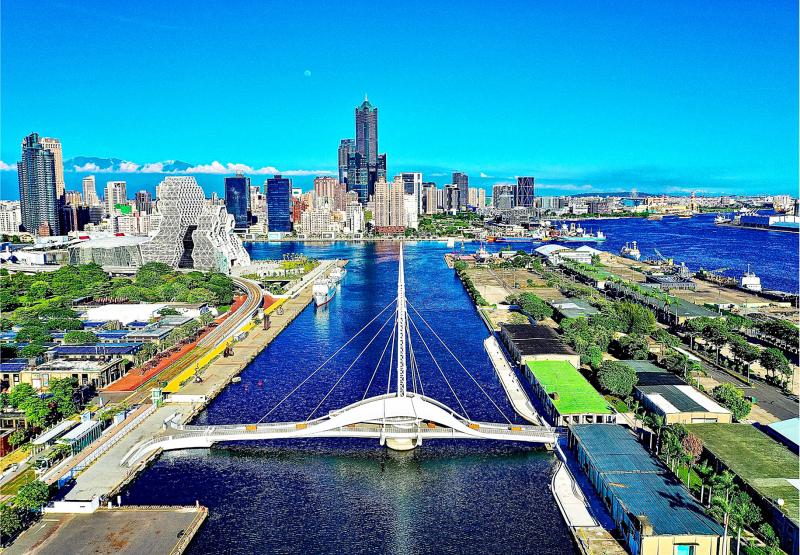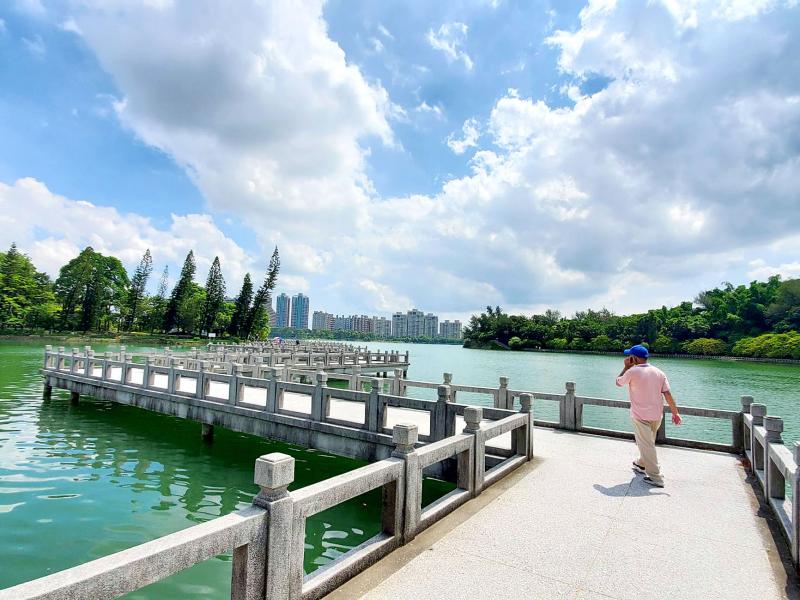Last week I was welcomed by Kaohsiung, a city of lower prices, warmer climate, friendly people and slower pace of life. These traits were brought into sharper focus thanks to a dinner chat with the kind people of the American Chamber of Commerce of Southern Taiwan.
Readers may recall that Chinese firm Shanghai Fosun Pharmaceutical Group Co (上海復星醫藥集團) demanded that the Taiwanese government hand over the health data of anyone vaccinated with its vaccines. A chamber member told me that a Chinese executive in Johnson & Johnson inserted the same demand in its contract. Of course the Taiwanese government had to refuse.
Yes, there was an effort, coordinated from Beijing, in part using Chinese executives in western firms, to stop Taiwan from acquiring vaccines. This episode illuminates who those executives answer to. It should be obvious that Beijing not only can coordinate their actions, but that any information about the firm such an executive has access to, Beijing already has.

Photo courtesy of the Kaohsiung City Government
FUTURE PLANS
Brian Aiello, President of Southern Taiwan AmCham, spoke to me at length about AmCham’s programs and plans, as well as the problems Kaohsiung faces. The Taipei Chamber, he observes, is more focused on the national level. The southern chamber, by contrast, is resolutely local.
Kaohsiung, he said, has a lower level of internationalization than Taipei or Taichung.

Photo: Chen Wen-chan, Taipei Times
“In Taiwan,” he said, “there are many traditions that still hold strong. This is sometimes inhibiting.”
Businesses in southern Taiwan often create products and then focus narrowly on one market, when there might be a number of other applications for them.
Another problem Kaohsiung faces is that it is viewed as a poor destination for young talent. He said that AmCham is attempting to attack this problem via internship programs.
One concern is that, compared to other major cities, Kaohsiung has a lower level of English. The city has a Bilingual Commission that has periodic meetings, which AmCham participates in. They advise the government on decisions such as what to name things in English. It also has an education center that it uses for events and speeches.
The chamber is also trying to get “landmark industries” to move into the city. Such industries might include environmental firms that work on solar-related projects that have high export potential. One of its long-term goals is to get people to return to Taiwan, to get them to consider coming back to good jobs with decent pay and a comfortable lifestyle.
The city, he pointed out, already has a solid base of firms with world-class technologies. In the health field alone, he gave several examples. One local company has developed a disinfectant spray that kills 99 percent of germs, including COVID-19, yet is not toxic to humans and has no strong smell. Anyone who has ever endured the stench left by someone spraying down his seat in closed train carriage with alcohol spray would surely welcome that.
A local company has also developed a 10-minute, highly accurate test for COVID-19. Another interesting technology Aiello instanced was a hydrogen-based therapy already licensed in Japan where doctors are using it to attack cancer and other diseases.
Clearly the basis for growth is present. AmCham is working on speeding up the approval process and generating more government support for new products and technologies.
One advantage the city has is land, he said. After the heavy industries left 20 or 30 years ago, the government sat on large tracts of land, letting it rest. Unfortunately, the city has struggled to attract new businesses ever since.
WHITE PAPER
Aiello has written most of the organization’s recent White Papers.
“We don’t include every problem in our White papers, and we don’t point fingers,” he said.
Instead, he described, AmCham’s white papers focus on problems for which they can propose solutions.
In 2011 Aiello was a member of Taiwan’s APEC (Asia-Pacific Economic Cooperation) delegation to the meeting in Montana that year. During the meeting a White House official drew him aside and asked for a couple of copies of the White Paper. They would be, he was assured, read by then-president Barack Obama.
Another issue Southern Taiwan AmCham is working on is supply chain security. A number of firms are thinking of following the Taiwan Semiconductor Manufacturing Co (TSMC, 台積電) model of building factories in countries that are important markets. AmCham helps them research US state and local incentives for relocating factories to the US.
“We try to create situations where you have mutual benefit,” he said. “We try to get involved with all levels: What is the government perspective? What is the local business perspective? What is the perspective of the local population?”
Several years ago the chamber opened its doors to local firms, which has helped it to understand local perspectives and situations much better.
Aiello also added that the changing international climate is shaping their activities. The US has become more pro-active in its support for Taiwan, he observed. Given Japan’s recent and very public turn to Taiwan, if they can include Japan in what they are doing, they consider that a win-win. Not only is that good for Taiwan’s security, it also helps the economies of all three countries.
Southern Taiwan AmCham covers the counties of Penghu, Yunlin, Chiayi, Pingtung and Taitung, and the municipalities of Tainan and Kaohsiung. The organization has plans to set up offices in each, to deal directly with local governments and local businesses.
Though the energetic and engaging Aiello has already reached an age at which most people would be retiring, he plans to continue his involvement with the world around him.
“I really want to make a difference,” he says. “My position at AmCham has always been as an unpaid volunteer. The way I see it, it is my way of creating a secure and robust continuing relationship between Taiwan, my home for about a third of my life, and the US, which I will always support.”
Notes from Central Taiwan is a column written by long-term resident Michael Turton, who provides incisive commentary informed by three decades of living in and writing about his adoptive country. The views expressed here are his own.

Jacques Poissant’s suffering stopped the day he asked his daughter if it would be “cowardly to ask to be helped to die.” The retired Canadian insurance adviser was 93, and “was wasting away” after a long battle with prostate cancer. “He no longer had any zest for life,” Josee Poissant said. Last year her mother made the same choice at 96 when she realized she would not be getting out of hospital. She died surrounded by her children and their partners listening to the music she loved. “She was at peace. She sang until she went to sleep.” Josee Poissant remembers it as a beautiful

Before the last section of the round-the-island railway was electrified, one old blue train still chugged back and forth between Pingtung County’s Fangliao (枋寮) and Taitung (台東) stations once a day. It was so slow, was so hot (it had no air conditioning) and covered such a short distance, that the low fare still failed to attract many riders. This relic of the past was finally retired when the South Link Line was fully electrified on Dec. 23, 2020. A wave of nostalgia surrounded the termination of the Ordinary Train service, as these train carriages had been in use for decades

Lori Sepich smoked for years and sometimes skipped taking her blood pressure medicine. But she never thought she’d have a heart attack. The possibility “just wasn’t registering with me,” said the 64-year-old from Memphis, Tennessee, who suffered two of them 13 years apart. She’s far from alone. More than 60 million women in the US live with cardiovascular disease, which includes heart disease as well as stroke, heart failure and atrial fibrillation. And despite the myth that heart attacks mostly strike men, women are vulnerable too. Overall in the US, 1 in 5 women dies of cardiovascular disease each year, 37,000 of them

Politically charged thriller One Battle After Another won six prizes, including best picture, at the British Academy Film Awards on Sunday, building momentum ahead of Hollywood’s Academy Awards next month. Blues-steeped vampire epic Sinners and gothic horror story Frankenstein won three awards each, while Shakespearean family tragedy Hamnet won two including best British film. One Battle After Another, Paul Thomas Anderson’s explosive film about a group of revolutionaries in chaotic conflict with the state, won awards for directing, adapted screenplay, cinematography and editing, as well as for Sean Penn’s supporting performance as an obsessed military officer. “This is very overwhelming and wonderful,” Anderson